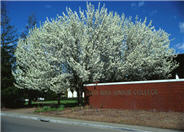
Common name:Sago-Palm
Botanical name:Cycas revoluta
Sago Palm resembles small palms; it is evergreen. It can slowly grow to 10'. It is used for a tropical effect and also looks great in planters. In the low desert, light shade and additional moisture are best. Side sprouts can form multi-trunked individuals. Apply fertilizer at leaf expansion. This plant has few pests.

Common name:Early Sunrise Coreopsis/Tickseed
Botanical name:Coreopsis grandiflora 'Early Sunrise'
The 'Early Sunrise' is a wonderful cultivar and showy, southern U.S. native. Semi-double, deep yellow flowers that flush to orange-yellow near the center on 18" tall bushy plants bloom from June to September in full sun and average to dry soils. It makes for good cut flowers, and pruning keeps the plants abundant with blooms. -Holland WIldflower Farm

Common name:Temari Violet Verbena
Botanical name:Verbena 'Temari Violet'
This perennial will grow 1'-3' tall and has small green leaves with violet flowers that bloom all year.

Common name:Mugho Pine
Botanical name:Pinus mugo
Pinus mugo is an evergreen tree or shrub that grows slowly. Needles are 2", dark green, stout, and crowded. Cones are 1"-2", oval, and tawny to dark brown. Generally a bushy, twisted, somewhat open pine.

Common name:Deodar Cedar
Botanical name:Cedrus deodara
This fast-growing, coniferous evergreen is capable of reaching a size of 80' high by 40' wide. Its needles are a light, silvery green color, 2" long. Flowers are inconspicuous. Barrel shaped cones appear in fall and winter. Branches are pendulous and spreadings. Plant in area that has ample room for growth.

Common name:Bradford Callery Pear
Botanical name:Pyrus calleryana 'Bradford'
The 'Bradford' is a deciduous tree that grows to a size of 25'-30'. Profuse clusters of single white flowers are borne in the spring from noticeably sweeping branches.
An efficient watering system applies the right amount of water to the right parts of the garden at the right time. This conserves water and saves you money.
Click in the green box for more information
Designer:
Photographer: GardenSoft
Maintain a two to four inch layer of mulch on the soil surface to reduce weeds, infiltrate rain water, and reduce compaction.
Attract, or buy beneficial insects such as ladybugs and lacewings to control pest outbreaks in your garden.